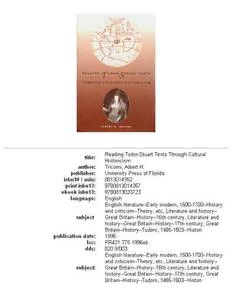
Reading Tudor-Stuart texts through cultural historicism PDF
01996·0.905 MB·English
Most books are stored in the elastic cloud where traffic is expensive. For this reason, we have a limit on daily download.
Preview Reading Tudor-Stuart texts through cultural historicism
Description:
In an assessment of the new historicism as a form of historical knowledge, Albert Tricomi moves beyond it to present what he calls new cultural historicism. In pursuing this theme, he examines Tudor-Stuart representations of surveillance and the cultural oversight of the sexual body as revealed in Elizabethan-Jacobean drama to bring together two discourses that have not been joined before. Tricomi shows the inadequacy of an older, event-based historical criticism that excludes various forms of cultural knowledge, including metaphor and states of mind as revealed in literary texts. At the same time, he demonstrates a more robust historicism by joining functional cultural analyses to a conception of historical understanding that can recognize both events and processes. Tricomi suggests new and controversial possibilities of what historicized literary studies might be. His study will contribute to the emergence of a more extensive and vigorous cultural historicism.
See more
The list of books you might like
Most books are stored in the elastic cloud where traffic is expensive. For this reason, we have a limit on daily download.
